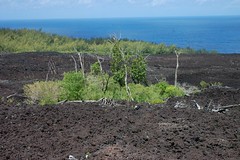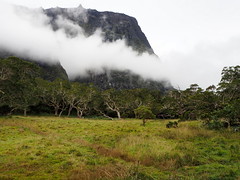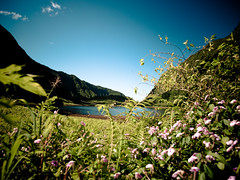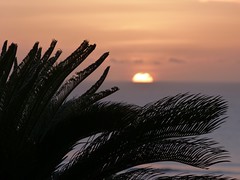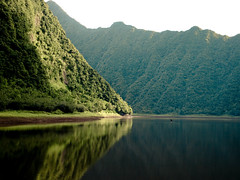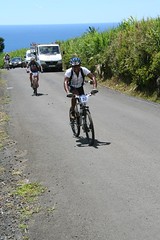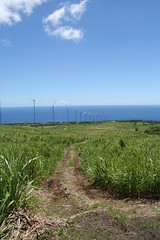 Réunion
Réunion
Réunion (English: /rˈnjən/; French: La Réunion, French: [la ʁe.y.njɔ̃]; previously Île Bourbon;) is an island in the Indian Ocean that is an overseas department and region of France. It is located approximately east of the island of Madagascar and southwest of the island of Mauritius. , it had a population of 873,102.
Like the other four overseas departments, Réunion also holds the status of a region of France, and is an integral part of the French Republic. Réunion is an outermost region of the European Union and is part of the eurozone. Réunion and the fellow French overseas department of Mayotte are the only eurozone regions located in the Southern Hemisphere.
As in the rest of France, the official language of Réunion is French. In addition, a majority of the region's population speaks Réunion Creole.
Toponymy
When France took possession of the island in the seventeenth century, it was named Bourbon, after the dynasty that then ruled France. To break with this name, which was too attached to the Ancien Régime, the National Convention decided on 23 March 1793, to rename the territory Réunion Island. ("Réunion", in French, usually means "meeting" or "assembly" rather than "reunion". This name was presumably chosen in homage to the meeting of the fédérés of Marseilles and the Paris National Guards that preceded the insurrection of 10 August 1792. No document establishes this and the use of the word "meeting" could have been purely symbolic)
The island changed its name again in the 19th century: in 1806, under the First Empire, General Decaen named it Île Bonaparte (after Napoleon), and in 1810 it became Île Bourbon again. It was permanently renamed Réunion after the fall of the July monarchy by a decree of the provisional government on 7 March 1848.
In accordance with the original spelling and the classical spelling and typographical rules, "la Réunion" was written with a lower case in the article, but during the end of the 20th century, the spelling "La Réunion" with a capital letter was developed in many writings to emphasize the integration of the article in the name. This last spelling corresponds to the recommendations of the Commission nationale de toponymie and appears in the current Constitution of the French Republic in articles 72-3 and 73.
History
The island has been inhabited since the 17th century, when people from France and Madagascar settled there. Slavery was abolished on 20 December 1848 (a date celebrated yearly on the island), when the Second Republic abolished slavery in the French colonies. However, indentured workers continued to be brought to Réunion from South India, among other places. The island became an overseas department of France in 1946.
Not much is known of Réunion's history prior to the arrival of the Portuguese in the early 16th century. Arab traders were familiar with it by the name Dina Morgabin, "Western Island". The island is possibly featured on a map from 1153 AD by Al Sharif el-Edrisi. The island might also have been visited by Swahili or Austronesian (Ancient Indonesian–Malaysian) sailors on their journey to the west from the Malay Archipelago to Madagascar.
The first European discovery of the area was made around 1507 by Portuguese explorer Diogo Fernandes Pereira, but the specifics are unclear. The uninhabited island might have been first sighted by the expedition led by Dom Pedro Mascarenhas, who gave his name to the island group around Réunion, the Mascarenes. Réunion itself was dubbed Santa Apolónia after a favourite saint, which suggests that the date of the Portuguese discovery could have been 9 February, her feast day. Diogo Lopes de Sequeira is said to have landed on the islands of Réunion and Rodrigues in 1509.
By the early 1600s, nominal Portuguese rule had left Santa Apolónia virtually untouched. The island was then occupied by France and administered from Port Louis, Mauritius. Although the first French claims date from 1638, when François Cauche and Salomon Goubert visited in June 1638, the island was officially claimed by Jacques Pronis of France in 1642, when he deported a dozen French mutineers to the island from Madagascar. The convicts were returned to France several years later, and in 1649, the island was named Île Bourbon after the French royal House of Bourbon. Colonisation started in 1665, when the French East India Company sent the first settlers.
Revolutionary revolts
On 19 March 1793, during the French Revolution, the island's name was changed to "Réunion Island" in homage to the meeting of the Federates of Marseille and the National Guards of Paris, during the march on the Tuileries Palace on 10 August 1792, and to erase the name of the Bourbon dynasty.
The abolition of slavery voted by the National Convention on 4 February 1794, was rejected by Réunion, as well as by Île de France (Mauritius). A delegation accompanied by military forces, charged with imposing the liberation of slaves, arrived on the island of Bourbon on 18 June 1796, only to be immediately expelled without mercy. There followed a period of unrest and challenges to the power of the metropolis, which no longer had any authority over the two islands. The First Consul of the Republic, Napoleon Bonaparte, maintained slavery there, which was never abolished in practice, with the law of 20 May 1802. On 26 September 1806, the island took the name of Bonaparte and found itself in the front line of the Franco-British conflict for the control of the Indian Ocean.
During the Napoleonic Wars, the island was invaded by British forces and its governor, General Sainte-Suzanne, was forced to capitulate on 9 July 1810. The island then came under British rule and was returned to the French under the Treaty of Paris of 1814.
Following climatic catastrophes of 1806-1807 (cyclones, floods), coffee cultivation declined rapidly and was replaced by sugar cane, whose demand in France increased, due to France's recent loss of Saint-Domingue, and soon of the Île-de-France (Mauritius). Because of its growth cycle, sugarcane is not affected by cyclones. In 1841, Edmond Albius' discovery of hand-pollination of vanilla flowers enabled the island to soon become the world's leading vanilla producer. The cultivation of geranium, whose essence is widely used in perfumery, also took off.
From 1838 to 1841, Rear Admiral Anne Chrétien Louis de Hell was governor of the island. A profound change of society and mentality linked to the events of the last ten years led the governor to present three emancipation projects to the Colonial Council.
On 20 December 1848, Sarda Garriga finally proclaimed the abolition of slavery (20 December was a holiday in Réunion). Louis Henri Hubert Delisle became its first Creole governor on 8 August 1852, and remained in this position until 8 January 1858. Europe increasingly turned to sugar beet to meet its sugar needs. Despite the development policy of the local authorities and the recourse to compromise, the economic crisis became evident from the 1870s onwards. Subsequently, the opening of the Suez Canal caused a shift in commercial traffic away from the island. However, this economic depression did not prevent the modernization of the island, with the development of the road network, the creation of the railroad and the construction of the artificial harbor of the Pointe des Galets. These major construction projects offered a welcome alternative for agricultural workers.
Modern history
From the 17th to the 19th centuries, French colonisation, supplemented by importing Africans, Chinese and Indians as workers, contributed to ethnic diversity in the population. From 1690, most of the non-Europeans on the island were enslaved. The colony abolished slavery on 20 December 1848. Afterwards, many of the foreign workers came as indentured workers. The opening of the Suez Canal in 1869 reduced the importance of the island as a stopover on the East Indies trade route.
During the Second World War, Réunion was under the authority of the Vichy regime until 30 November 1942, when Free French forces took over the island with the destroyer ''Léopard''.
Réunion became a département d'outre-mer (overseas département) of France on 19 March 1946. INSEE assigned to Réunion the department code 974, and the region code 04 when regional councils were created in 1982 in France, including in existing overseas departments which also became overseas regions.
Over about two decades in the late 20th century (1963–1982), 1,630 children from Réunion were relocated to rural areas of metropolitan France, particularly to Creuse, ostensibly for education and work opportunities. That program was led by influential Gaullist politician Michel Debré, who was an MP for Réunion at the time. Many of these children were abused or disadvantaged by the families with whom they were placed. Known as the Children of Creuse, they and their fate came to light in 2002 when one of them, Jean-Jacques Martial, filed suit against the French state for kidnapping and deportation of a minor. Other similar lawsuits were filed over the following years, but all were dismissed by French courts and finally by the European Court of Human Rights in 2011.
In 2005 and 2006, Réunion was hit by a crippling epidemic of chikungunya, a disease spread by mosquitoes. According to the BBC News, 255,000 people on Réunion had contracted the disease as of 26 April 2006. The neighbouring islands of Mauritius and Madagascar also suffered epidemics of this disease during the same year. A few cases also appeared in mainland France, carried by people travelling by airline. The French government of Dominique de Villepin sent an emergency aid package worth €36 million and deployed about 500 troops in an effort to eradicate mosquitoes on the island.
Administrative divisions
Administratively, Réunion is divided into 24 ''communes'' (municipalities) grouped into four ''arrondissements''. It is also subdivided into 25 cantons, meaningful only for electoral purposes at th…
Looking for places related to Réunion?
Those are other destinations to find places related to Réunion:


